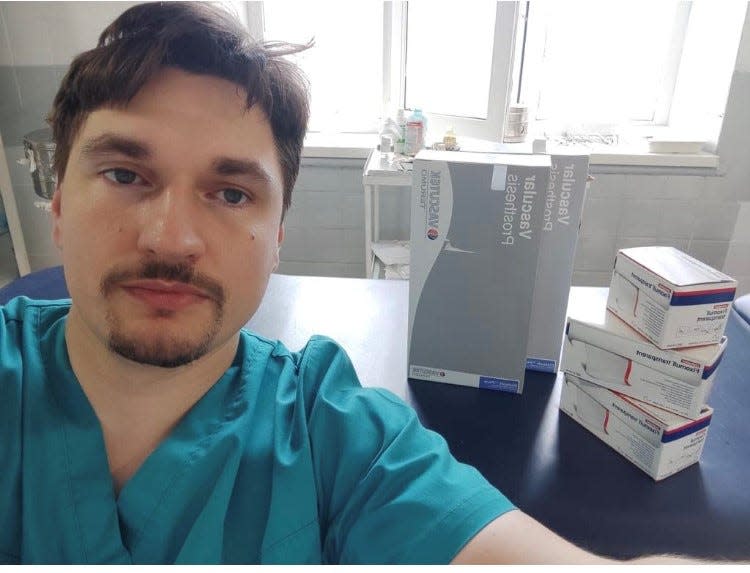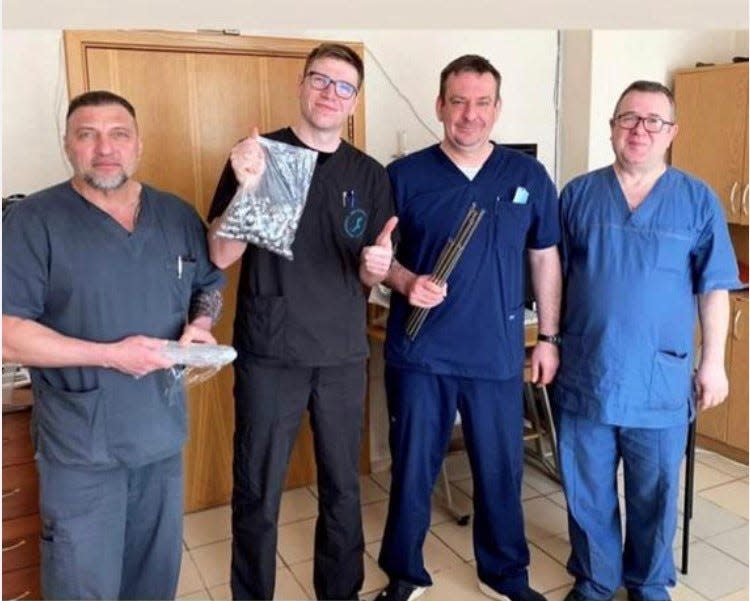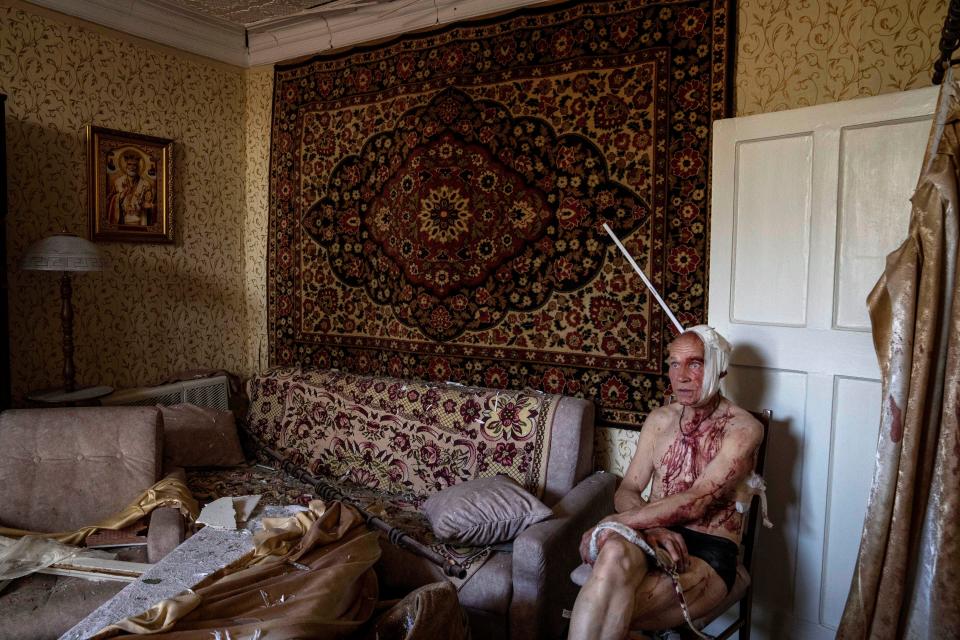Hardware and hardships: US doctors help Ukraine medical teams via telehealth, but needs are staggering
As a trauma specialist and orthopedic surgeon in the western Ukraine city of Uzhhorod, Andriy Buchok has grown used to the frequent 24-hour shifts that make him feel like he lives in the hospital where he works, routinely skipping his supposed days off.
Harder than that is the lack of medical equipment required to treat some war injuries, which can mean the difference between a patient keeping a limb and having it amputated.
“Sometimes when I speak with doctors from the USA or Europe or big countries, they don’t understand how we can do part of an operation without some instruments, without some equipment, without specialized power tools,” Buchok said by phone. “Sometimes we use building instruments, like Metabo or DeWALT, non-medicine instruments.”
Even in the relatively peaceful western part of the country, a population surge of displaced Ukrainians and the need for specialized care for some of the wounded make for extremely adverse conditions for medical professionals such as Buchok, who encounters injuries he never saw before the war.
An American health care network tries to help with an innovative approach, providing the expertise of its vast roster of specialists to several Ukraine medical centers while donating hundreds of thousands of dollars in supplies.

Northwell Health, the largest health care provider in New York state, incorporates the telemedicine system it developed through the COVID-19 pandemic to offer free consultations to medical workers in Ukraine on a 24/7 basis.
Medics on battlefields, clinicians in war zones or providers caring for wounded soldiers and civilians elsewhere can reach Northwell’s experts through web-based platforms, including Whatsapp and Telegram.
Dr. Eric Cioe-Peña, director of Northwell’s Center for Global Health, said no other system in the USA – and possibly the world – provides this level of telehealth support.
GRIM OUTLOOK: 'They behave like barbarians': Ukraine's chief war crimes investigator sees few prospects for reconciliation with Russians
Based on his experience working 24-hour shifts every Monday during the pandemic surges, which would leave him mentally fried, Cioe-Peña said much of the value in the consultations is getting input from an expert with a fresh perspective. The war scrambled the health care system in Ukraine and made such talks a rarity. Northwell started filling the gap in April and, after initial skepticism, found a receptive audience, he said.
“We had these front-line surgeons who were doing surgeries for something like 29 hours a day and were exhausted,” Cioe-Peña said. “And in some of the more complicated cases, they really wanted to be able to phone a friend and talk through the case with a well-rested Northwell physician to figure out the best way to do it. It took off pretty quickly.”
'They just sit down and cry for a little while'
The consultations, conducted through an interpreting service when language differences become an issue, have led to some of the physicians from both countries forming bonds. The discussions can also take an emotional toll.
In a Northwell video promoting the service, pediatrician Shari Sheflin talked about the anguish she felt after some calls and the difficult juxtaposition of attending her child’s school event shortly after taking a call about a kid who was very sick in Ukraine.

Cioe-Peña said he found looking at the CAT scan of a Ukrainian whose face was “completely crushed from a blast impact” and another one with white phosphorus burns very impactful.
“Most of our physicians have said this: They get off the phone, having dealt with a case, and they just sit down and cry for a little while, because it’s just been such an emotional thing,” he said.
Buchok, 32, doesn’t have time for much contemplation amid the steady stream of patients who come his way. In addition to the rising number of civilians who sought refuge in the Uzhhorod area – on the border with Slovakia – some injured soldiers are transferred there after getting emergency field care and possibly making a stop at a military hospital away from the war zone.
A health system under 'severe pressure'
Patients can get reconstructive surgery at the Uzhhorod City Clinical Hospital where Buchok toils, and he’s grateful for the guidance he receives from Northwell specialists on complex cases in which he lacks experience. Buchok talks to them once or twice a week.
“When I use telemedicine, I have one more tactic for treating our patients, and it’s very good in choosing the (right approach),” Buchok said. “It’s very nice to speak with other orthopedists from USA and get help in tactical treatment of my patients.”
FULL COMMITMENT: Biden vows US, NATO allies will stand with Ukraine 'for as long as it takes'
But it’s hard to apply the advice without the necessary orthopedic implants and other medical devices and equipment that are in short supply in some parts of Ukraine.
In a report June 3, the World Health Organization said the country’s health care system is under “severe pressure” from increased need and reduced ability to offer services, partly because of Russian attacks on medical facilities.
Numerous organizations have tried to fill at least part the void. The WHO, which estimated the health response in Ukraine from March to August will cost $80 million, arranged for the delivery of supplies and the deployment of medical teams. The Ukrainian Medical Association of North America (UMANA) said it sent four planes with 350 tons of medical supplies. Many others have contributed.
The Ukrainian health system was in no condition for the onslaught of the Russian invasion; it lagged its European counterparts even before the war began Feb. 24.
That realization struck Chandra Hassan, director of bariatric surgery at the University of Illinois Hospital in Chicago, during the three trips he made to Ukraine starting in November 2021.
“Even though Ukraine is in the geographical heart of Europe, the lack of facilities in public hospitals was simply unbelievable, especially coming from the U.S.,” Hassan said. “They have excellent surgeons. They do heart surgeries, and they’re very skillful, very talented. But the lack of facilities was like what you’d find in a very poor, underdeveloped country.”

Hassan noticed that soon after arriving last year to perform bariatric surgeries in Lviv, a western city close to the Polish border with a population of more than 700,000 before the war.
The sight of so many amputees 'kind of a shocker'
Hassan returned in April and May this year, first to Lviv and its surroundings to identify medical needs caused by the conflict, and on the third trip to Odesa in the south to provide training in CPR, applying tourniquets and other lifesaving skills.
The second trip was “kind of a shocker,” said Hassan, who saw dozens of young men with amputated limbs or severe injuries requiring physiotherapy that’s largely unavailable.
“I know we’re sending them so many weapons and these people are fighting daily to defend values that are dear to us, but once they get wounded, they’re not getting anywhere near the care of our wounded soldiers,” he said. “These were normal people like you and me a few months ago, and now they’re severely disabled on the path to being permanently disabled. That’s very hurtful.”
Yevhen Liulka, a cardiovascular surgeon in the central city of Poltava, said the country instituted medical reforms about five years ago to move closer to the health care models in Europe and the USA, focusing on modern hospitals and high-tech equipment.
Still, medical supplies typically didn’t arrive until a year after they were purchased, even before the war. Now, the need for them is bigger and more immediate.
The WHO said there’s unmet demand for mental health services – Buchok said the problem predates the war and obviously has increased – and for training to treat effects from combat, including trauma surgery.
The overworked Buchok said, “Our medical system was not prepared for so many people with these types of injuries.’’
This article originally appeared on USA TODAY: American doctors help Ukraine through telehealth, but needs still huge


